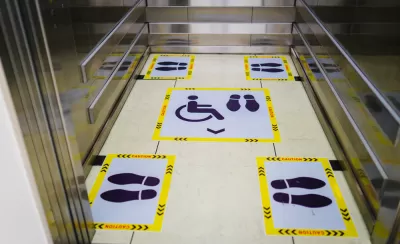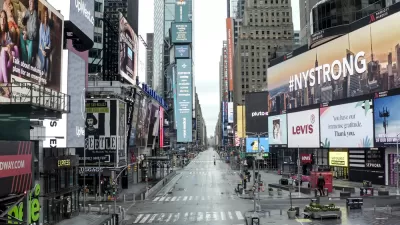Since COVID-19 won't last forever, planners should not act as if it will, according to this opinion.

In one of my Facebook groups, someone recently suggested that more zoning codes should allow boarding houses as a form of affordable housing. Traditionally, a boarding house is a living setting where people economized on expenses by sharing a kitchen or maybe even meals. Someone else responded that this was a terrible idea, because people obviously can avoid each other (and thus avoid COVID-19 infection) more effectively when they live alone. The latter view is based on an assumption that might seem reasonable at first glance—that all land use decisions should facilitate social distancing to protect us from COVID-19. And if COVID-19 is going to last forever, this argument makes perfect sense. So what's wrong with COVID-friendly planning and zoning?
For one thing, COVID-19 won’t last forever—and it might not even last all year. Other worldwide epidemics (such as the 14th century Black Death, and the 1918-20 "Spanish Flu") eventually disappeared, despite the absence of modern medical technology. COVID-19 is likely to ebb eventually as well, though perhaps less rapidly in the United States than in nations that are aggressively vaccinating their citizenry.
Admittedly, other worldwide epidemics will happen–but there is no reason to believe that the strategies of social distancing and lockdowns will be the best way to stop them. The last major epidemic that affected the United States was AIDS, which was spread not by breathing but by sexual contact, blood transfusions, and drug use. The next epidemic may be as different from COVID-19 as COVID-19 was from AIDS. So whatever policies we adopt to restrict COVID-19 may be ineffective or even harmful when another major epidemic occurs.
More importantly, the “do policy X because policy X is COVID-friendly” idea leads to absurd results if applied consistently. For example, we know that senior citizens are more at risk from COVID-19 than other people. And we know that face-to-face contact is especially likely to spread COVID-19. So if our first priority was to protect seniors from infection forever, we would forbid anyone from living with persons over 65. In fact, prohibiting seniors from seeing their children and grandchildren would be more effective still, because even a casual visit can be deadly. So a truly pandemic-friendly zoning code would require seniors to be in solitary confinement until they have passed away from some non-COVID-related cause—obviously an absurd result. (If I wanted to write a 50-page scholarly article instead of a short blog post, I would pad my manuscript with even more absurd hypotheticals—but I suspect most people are no more interested in reading such an article than I am in writing it.)
In sum, I’m not really sure what pandemic-friendly city planning is—but if it means "let’s mandate social distancing forever," I am pretty sure I am not for it.

Planetizen Federal Action Tracker
A weekly monitor of how Trump’s orders and actions are impacting planners and planning in America.

Maui's Vacation Rental Debate Turns Ugly
Verbal attacks, misinformation campaigns and fistfights plague a high-stakes debate to convert thousands of vacation rentals into long-term housing.

Restaurant Patios Were a Pandemic Win — Why Were They so Hard to Keep?
Social distancing requirements and changes in travel patterns prompted cities to pilot new uses for street and sidewalk space. Then it got complicated.

In California Battle of Housing vs. Environment, Housing Just Won
A new state law significantly limits the power of CEQA, an environmental review law that served as a powerful tool for blocking new development.

Boulder Eliminates Parking Minimums Citywide
Officials estimate the cost of building a single underground parking space at up to $100,000.

Orange County, Florida Adopts Largest US “Sprawl Repair” Code
The ‘Orange Code’ seeks to rectify decades of sprawl-inducing, car-oriented development.
Urban Design for Planners 1: Software Tools
This six-course series explores essential urban design concepts using open source software and equips planners with the tools they need to participate fully in the urban design process.
Planning for Universal Design
Learn the tools for implementing Universal Design in planning regulations.
Heyer Gruel & Associates PA
JM Goldson LLC
Custer County Colorado
City of Camden Redevelopment Agency
City of Astoria
Transportation Research & Education Center (TREC) at Portland State University
Jefferson Parish Government
Camden Redevelopment Agency
City of Claremont






























